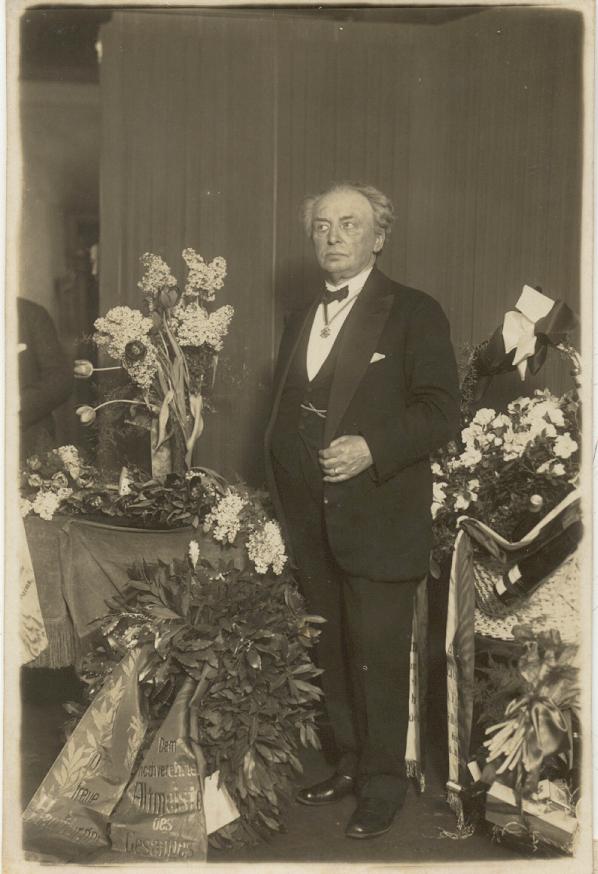Heinrich Bötel
6 March 1854 Hamburg – 6 January 1938 Hamburg
His father had a horse-and-cart haulage business, and he worked for him as a coachman. He sang as a soloist in an amateur choir,
where he was discovered by the impresario of the Hamburg opera, Bernhard Pollini. After only very quick and superficial vocal
studies with conductor Hermann Zumpe and baritone Franz Krückl, he made his debut in a concert at the Hamburg opera
(called "Stadttheater" at the time) on 16 April 1882. He was successful, and Pollini gave him a contract. Bötel's operatic
debut took place on 6 January 1883 as Lyonel in Martha, Zumpe conducting.
He was soon dubbed the "second Theodor Wachtel" – one of the big names in Hamburg's operatic history, a tenor who had been
a coachman, too, and who was famous for his glorious top notes, just like Bötel. Bötel's repertory was centered around
roles that require a high C and more: Arnold, Manrico, Raoul, Tonio in La fille du régiment, and notably Chapelou,
which was his signature role, not least also because of his particular skill in cracking the whip (as a former coachman, mind you!), which is
required in Chapelou's main aria.
His repertory included, other than the roles already mentioned, Alessandro Stradella, Turiddu, George Brown,
Massenet's des Grieux, Gounod's Faust, Masaniello, Stolzing, Jeník ("Hans" in the German translation), Ladislav ("Heinrich")
in Smetana's Dvě vdovy, Canio, Enzo, plus an unknown role in the 1891 world premiere of Der Pfeifer von
Dusenbach by a certain Richard Kleinmichel.
He would stay at the Hamburger Stadttheater for his entire career; but he made guest
appearances in Frankfurt (1884–93), Vienna (1884 and 1887), Berlin (Krolloper, 1884–92; Theater des Westens, 1898),
Cologne, Stuttgart, Wrocław/Breslau, Rotterdam (1890), Basel (1892), Bremen, Schwerin, Leipzig (1886), New York (Thalia
Theater, 1887) and Los Angeles (1898, he got paid 20,000 $ for 36 evenings).
By 1900, his voice was worn, and he left the ensemble of the Hamburg opera; but he continued to sing there (as well as at the
Schilleroper in Hamburg-Altona) as a guest until 1912. Even later on, he would sing at society events and in coffee houses.
In the Great Depression, he lost everything he had, but the City of Hamburg saved him by paying him an annuity for the rest of
his life.
Reference 1: article by Ulrich Dahmen in Stimmen, die um die Welt gingen, no. 1
Reference 2: Kutsch & Riemens
In RA format
I wish to thank Richard J Venezia for the recording.
Discography
Lieban, Berlin, about 1900
297x Trovatore (Verdi): Lodern zum Himmel 297x
Grammophon, Hamburg, 1908
12522-1u Martha (Flotow): Ach so fromm unpublished
12522-2u Martha (Flotow): Ach so fromm 4-42050, 61642, B42119, 20021
12523u Postillon de Lonjumeau (Adam): Freunde, vernehmet 4-42049, 61642, B42118, 20021
12524u Trovatore (Verdi): Lodern zum Himmel 4-42150
13545u Gute Nacht, du mein herziges Kind (Abt) 4-42152
13546u Trovatore (Verdi): Dass nur für mich dein Herz erbebt 4-42149
13547u Rigoletto (Verdi): O wie so trügerisch unpublished
13547½u Rigoletto (Verdi): O wie so trügerisch 4-42151
|
